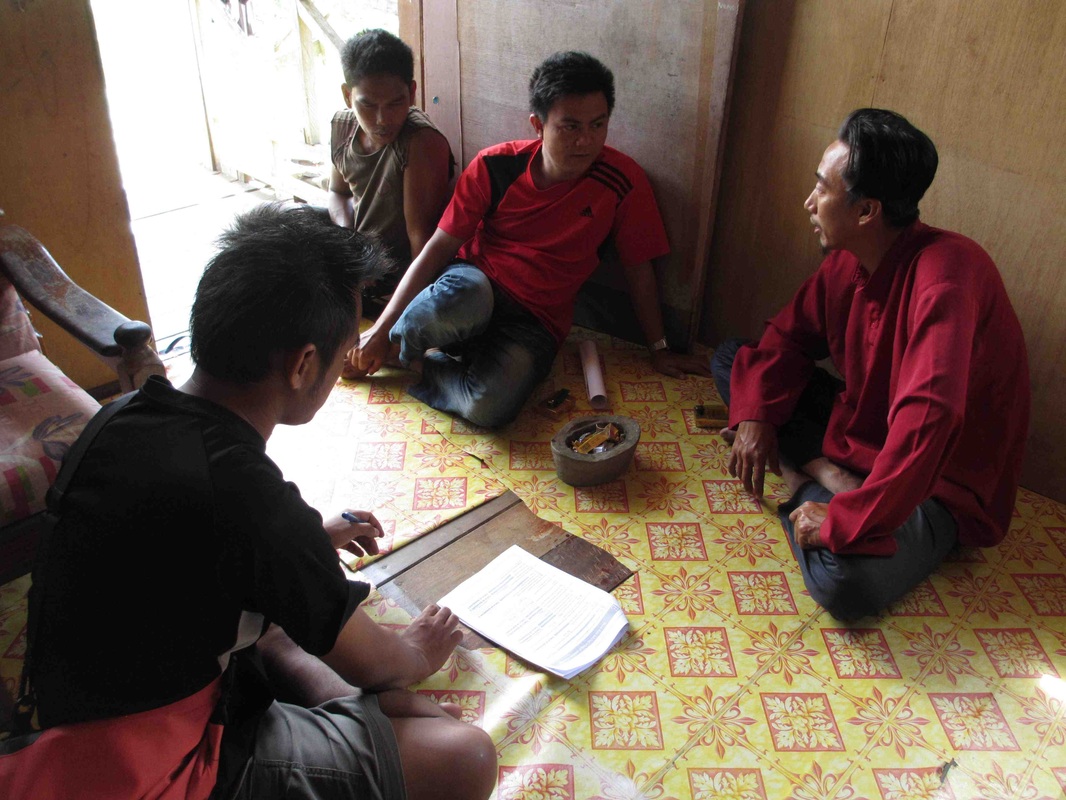A questionnaire for interview surveys (targeting the general riverine community) was developed over a period of a month and a half through consultations with KOCP members from Sukau (who are trained and experienced in interview development and implementation). Several group discussions were held between February 9 and March 15th, 2013 involving groups of 3 to 15 people, to draft the questionnaire. Prior to carrying out the interview survey, the village heads of Sukau and Menanggol villages were informed about the project and their permission obtained. The objective of this survey was to:
1. Determine the value and use of the river to the local community;
2. Identify perceived changes in fish populations;
3. Identify perceived threats to the river and fish populations;
4. Determine potential solutions.
This pilot surveys was also conducted to introduce the project to the broader community and test certain assumptions on which the project has been designed on a broader audience (e.g. that river health is closely linked to the health of fish populations; that the local riverine community perceives that there is a problem with their river and fish populations; that the local riverine community is willing to contribute to the conservation of their fish resources).
With the help of 14 staff from KOCP and 1 other person hired from the local community, 40 people in Sukau (roughly 5% of the adult population of the village) participated in the survey (30 male and 10 female) between the ages of 24 and 76 (average age 50) on March 16 and 17th. A boat was rented from KOCP for interviewers to access remote houses along the river.
The findings from the pilot are as follows:
The pilot interview survey has also allowed us to refine the questionnaire, to make it compact and clear. Through the pilot in Sukau, it was determined that interviewees should receive a non-monetary gift for their participation, as the average time to complete the survey is more than 30 minutes.
1. Determine the value and use of the river to the local community;
2. Identify perceived changes in fish populations;
3. Identify perceived threats to the river and fish populations;
4. Determine potential solutions.
This pilot surveys was also conducted to introduce the project to the broader community and test certain assumptions on which the project has been designed on a broader audience (e.g. that river health is closely linked to the health of fish populations; that the local riverine community perceives that there is a problem with their river and fish populations; that the local riverine community is willing to contribute to the conservation of their fish resources).
With the help of 14 staff from KOCP and 1 other person hired from the local community, 40 people in Sukau (roughly 5% of the adult population of the village) participated in the survey (30 male and 10 female) between the ages of 24 and 76 (average age 50) on March 16 and 17th. A boat was rented from KOCP for interviewers to access remote houses along the river.
The findings from the pilot are as follows:
- The river is still very important for the Sukau community, with a heavy dependence on the river for basic needs (drinking water, washing, bathing), food and income;
- The biggest perceived change noticed is the decline in water quality from pollution (45% of respondents), followed by the fact that people feel that the river water is no longer safe for drinking (although many still drink it) (35% of respondents), and an equal number of respondents felt that fish resources had been affected by pollution (35%);
- The biggest perceived threat is palm oil estates (pesticides and fertilizers) and processing plants (discharge into river);
- All respondents felt that the local community had a role to play in river and fish conservation. Cooperation between all stakeholders (e.g. local communities, estates, government) and awareness raising were common solutions suggested.
The pilot interview survey has also allowed us to refine the questionnaire, to make it compact and clear. Through the pilot in Sukau, it was determined that interviewees should receive a non-monetary gift for their participation, as the average time to complete the survey is more than 30 minutes.

 RSS Feed
RSS Feed